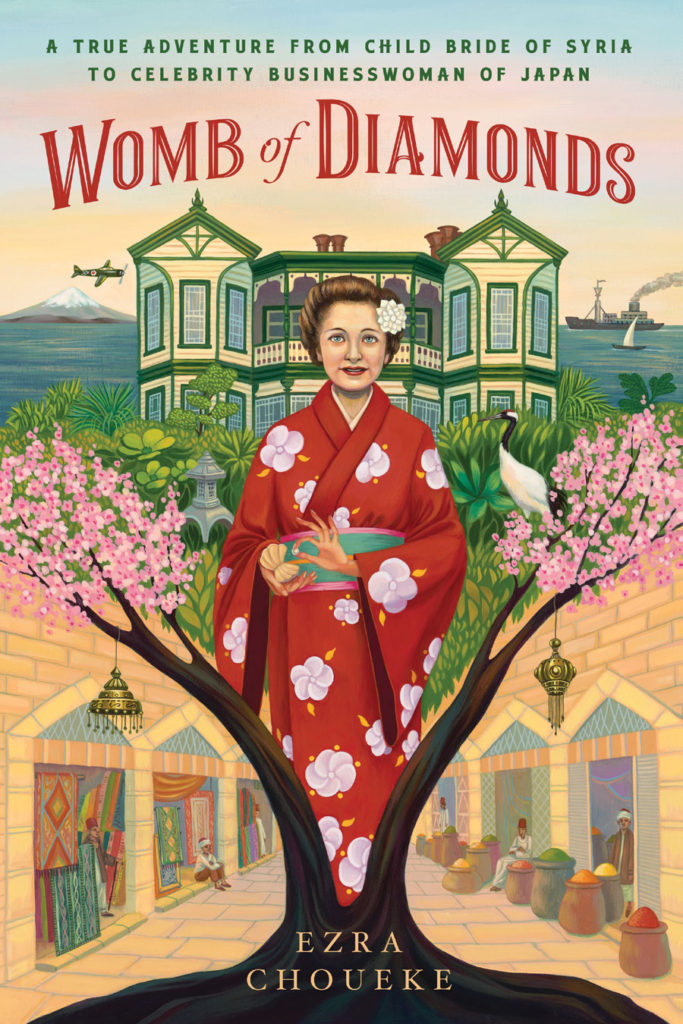
WOMB OF DIAMONDS IS A MUST READ
HAD YOU SEEN LUCIE CHOUEKE FROM ALEPPO, SYRIA ENTERTAINING THOUSANDS OF JAPANESE GUESTS ON A TYPICAL SUNDAY IN KOBE, SHE WOULDN’T HAVE APPEARED OUT OF PLACE. IN FACT, AFTER 84 YEARS IN JAPAN, MANY OF HER STRONGEST FRIENDSHIPS WITH PEOPLE OF DIFFERENT NATIONALITIES AND FAITHS BEGAN THERE BEFORE WORLD WAR TWO. WOMB OF DIAMONDS: A TRUE ADVENTURE FROM CHILD BRIDE OF SYRIA TO CELEBRITY BUSINESSWOMAN OF JAPAN TELLS THE STORY OF A UNIQUE PERSON SHAPED BY MANY CULTURES.
According to Lucie’s grandson, Ezra Choueke, he didn’t write this book to alleviate boredom or to assuage feelings of guilt. Lucie was in her mid-eighties and he was in his early thirties but they actually had a lot in common. She was operating three very profitable businesses and even Tony Soprano would have called her a “good earner.” Ezra was in China, working in manufacturing, and was incredibly stressed after a few years of 90 plus hour work weeks. As he barely had time for vacations, the short trip between Shenzhen and Kobe was a welcome distraction. She could tell Ezra had a lot on his mind. Therefore, after her usual questions confirming the health of the company, she changed the subject.
Most have questions about their grandparents and Ezra was no different. But in his case, there were a few glaring questions that even the most apathetic grandchild would have a difficult time ignoring. Why wasn’t Tetta (grandmother) a Syrian or Japanese citizen? Since Japan was a member of the Tri-Partite pact during World War Two, why wasn’t she killed? Why did thousands of people visit Tetta every week and why was she in those magazines? As the questions continued, the answers got more circuitous. They discussed much more than the obvious, like how to efficiently remove bugs from rationed rice, how to run a profitable black market enterprise, how expats honorably left their cheating spouses or untangled friends from difficult relationships, how only a woman can really appreciate an eight millimeter pearl, and the real reason many young bachelors were sent to Japan.
Lucie discussed how she came of age in the 1930s Jewish community of Aleppo, and at thirteen years old worked beside Muslims, Armenian Christians, and the French military. She fondly related how chickpeas were used instead of wedding invitations, where their pistachios were dried, indiscreet tales of the bathhouse, the magical properties of the souk, and tests for her marriage value involving goats and other barometers. She explained how she was tricked into an engagement with a 29 year-old man, as well as all the drama and emotional scarring that accompanied it.
Lucie detailed her introduction to Japanese culture in 1936, while she excelled as a partner in a dynamic international trading business. Soon however, with the arrival of World War II, everything she had built was threatened by American bombs, clever spies, Nazi sympathizers, food shortages, and snakes. She was unable to withdraw from the pressures though, as the Jewish community of Kobe needed to work together to save thousands of refugees from Europe.
Later in her life, Lucie became a very successful businesswoman and loved nothing more than to help others start their own enterprises. She doesn’t communicate this knowledge with the vaguery of a hedge fund manager on CNBC. Rather, she tells you how “roasting a chicken in its own fat” applies to property management. She uses humorous stories from Syria and Japan to explain how things get done.

While this book is about Lucie’s adventures, it is also the story of many Sephardic grandmothers born around this time period. It touches on the difficulties of being a woman in Arab cultures, the joys of the simplicity of life, and the amazing transformations many women underwent after their migrations to more open societies.
The appendices of the book follow the story of the Jews of Japan for the last ninety years. Lucie, as the last remaining Japan resident of the former Sephardi community of Kobe, adds her remembrances to the written record.
As for Ezra, the 15 years of Sundays they worked on this book, gave him a new appreciation of her strength. There were many times he was skeptical of what he was hearing. At one point, he took a break from their interviews and researched various historical subjects to fact check the details of their discussions. Ezra’s research only confirmed her stories.
Eventually, it came time for them to take separate journeys, but the anecdotes, lessons, history, and laughter are recorded in this book. They hope it reminds readers of the days Jews loved Aleppo. They hope it communicates the good intentions of their Japanese friends, but most of all, they hope it helps a few understand where they came from. As for Ezra, after writing this book, he understands why he was so drawn to Lucie’s story, why thousands of people visited her each week, and he cherishes every moment they spent together.



